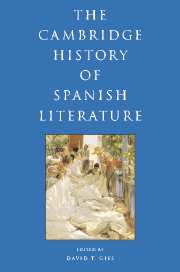Book contents
- Frontmatter
- I INTRODUCTION
- II HISTORY AND CANONICITY
- III THE MEDIEVAL PERIOD
- IV EARLY MODERN SPAIN: RENAISSANCE AND BAROQUE
- V THE ENLIGHTENMENT AND NEOCLASSICISM
- VI THE FORGING OF A NATION: THE NINETEENTH CENTURY
- VII THE MODERN, MODERNISMO, AND THE TURN OF THE CENTURY
- 32 Nineteenth-century women writers
- 33 The Catalan Renaixença
- 34 Great masters of Spanish Modernism
- 35 The poetry of Modernismo in Spain
- 36 Modernism in Catalonia
- 37 Modernist narrative in the 1920s
- 38 Noucentisme
- 39 Ideas, aesthetics, historical studies
- 40 The Catalan Avant-Garde
- VIII TWENTIETH-CENTURY SPAIN AND THE CIVIL WAR
- IX IN AND OUT OF FRANCO SPAIN
- X POST-FRANCO SPANISH LITERATURE AND FILM
- Bibliography
- Index
- References
38 - Noucentisme
from VII - THE MODERN, MODERNISMO, AND THE TURN OF THE CENTURY
Published online by Cambridge University Press: 28 March 2008
- Frontmatter
- I INTRODUCTION
- II HISTORY AND CANONICITY
- III THE MEDIEVAL PERIOD
- IV EARLY MODERN SPAIN: RENAISSANCE AND BAROQUE
- V THE ENLIGHTENMENT AND NEOCLASSICISM
- VI THE FORGING OF A NATION: THE NINETEENTH CENTURY
- VII THE MODERN, MODERNISMO, AND THE TURN OF THE CENTURY
- 32 Nineteenth-century women writers
- 33 The Catalan Renaixença
- 34 Great masters of Spanish Modernism
- 35 The poetry of Modernismo in Spain
- 36 Modernism in Catalonia
- 37 Modernist narrative in the 1920s
- 38 Noucentisme
- 39 Ideas, aesthetics, historical studies
- 40 The Catalan Avant-Garde
- VIII TWENTIETH-CENTURY SPAIN AND THE CIVIL WAR
- IX IN AND OUT OF FRANCO SPAIN
- X POST-FRANCO SPANISH LITERATURE AND FILM
- Bibliography
- Index
- References
Summary
Noucentisme designates the dominant cultural movement in Catalonia from 1906, the year of Solidaritat Catalana (the Unified Catalanist Front), to 1923, when the political, cultural, and economic entente broke down under the dictatorship of Miguel Primo de Rivera. Noucentisme is often understood merely to characterize the ideological support given by a group of artists and intellectuals to the Lliga Regionalista de Catalunya. Under the leadership of Enric Prat de la Riba (1870–1917), this reformist party created the Mancomunitat, an embryonic autonomous government. Through a dexterous use of the meager competencies and resources of this institution, Prat developed an inchoate infrastructure with a view to modernizing Catalonia. This entailed, among other things, consolidating its industrial economy. It would be misleading, however, to identify the Lliga narrowly with class interests. As Joan Fuster remarks, to speak about this party as if it were the political equivalent of the Catalan bourgeoisie would be inaccurate, for the bourgeoisie that threw in its lot with Cambó’s (1876–1947) and Prat’s regionalism was not the same bourgeoisie that followed Alfonso Sala after Primo de Rivera’s coup in September 1923.
Prat tackled the difficult task of building proto-governmental structures in a society that was devoid of political power. Lacking the legal basis and the means for actual governance, he laid the foundations of a modern civic society by intervening in the areas of education, technical expertise, and culture. The noucentistes saw themselves as purveyors of the idealism required for an ambitious project steered by the politicians and energized by the country’s economic leadership.
- Type
- Chapter
- Information
- The Cambridge History of Spanish Literature , pp. 532 - 537Publisher: Cambridge University PressPrint publication year: 2005



